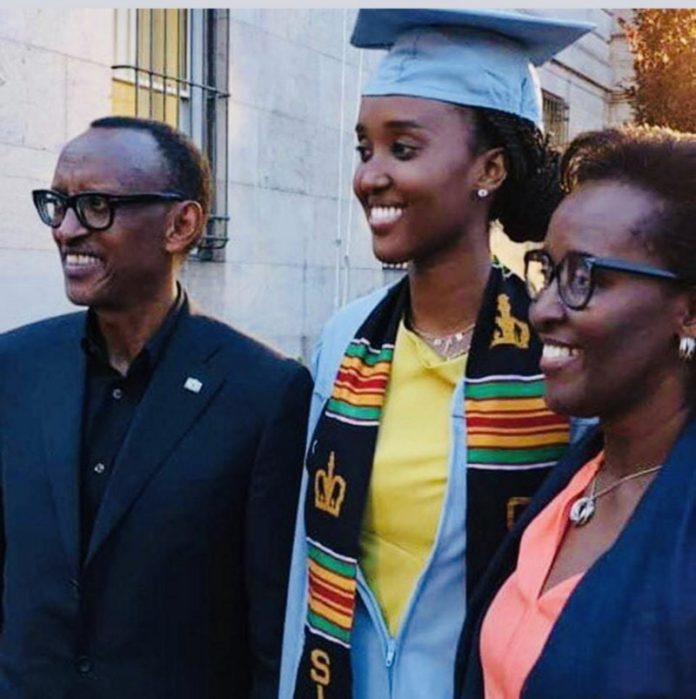
On Tuesday, August 2, 2023, amid a flurry of governmental appointments, a particularly familiar surname stood out — Kagame. President Paul Kagame, in a cabinet meeting he chaired, designated his daughter, Ange Ingabire Kagame, to a significant position within his office: the deputy executive director in charge of the strategy and policy council. But what could seem as a regular governmental procedure to some, appears as a continuation of a concerning trend to others.
Ange Kagame, at the age of 29, has swiftly climbed the ranks of Rwandan governance. While her professional credentials — including her role as a senior policy analyst since 2019 and holding degrees in political science and international affairs from US institutions — may be impressive, her rapid ascent raises eyebrows. Especially when observed through the lens of Rwanda’s political environment and the critical role family ties play.
Analysts speculate that Ange Kagame’s meteoric rise may not solely be due to her qualifications. There are whispers tying her promotion to the upcoming 2024 presidential elections and the possibility of her taking on an even more significant role, perhaps replacing Kagame himself, if unforeseen circumstances arise. These conjectures are fuelled by Kagame’s past assertion that he believes his successor might be a woman. While Kagame’s sons maintain a relatively low profile, Ange fervently defends her father on social media platforms, hinting at a keen interest in the nation’s politics and her father’s legacy.
Further delving into the realm of personal affiliations, Ange Kagame’s marital ties to Bertrand Ndegeyingoma, reportedly a senior figure at the National Bank of Rwanda, adds another layer of complexity. Bertrand’s familial ties to Bill Ndengeyingoma, who was implicated in the Panama papers scandal, and close connections with the dissident Eugene Richard Gasana, former Rwandan Ambassador to the UN, create a tangled web of relations. Interestingly, some sources claim it was Gasana who introduced the couple during the 2016 Rwanda Day in San Francisco, USA.
While Ange’s appointment dominated the headlines, it was by no means the only significant designation:
- Dan Munyuza, the former Inspector General of Police (IGP), now takes on the role of Rwanda’s ambassador to Egypt. He fills the shoes left vacant by former banker Alfred Kalisa. Munyuza’s appointment, especially after being replaced as IGP earlier in the year.
- Maj Gen Charles Karamba, previously Rwanda’s envoy to Tanzania, has been promoted as Rwanda’s ambassador to Ethiopia. Additionally, he’s now the Permanent Representative to the African Union. He succeeds Hope Tumukunde Gasatura, showcasing Kagame’s reliance on experienced military figures in diplomatic roles.
- Michel Sebera, previously serving at the Rwandan embassy in The Netherlands, has been appointed as Rwanda’s first-ever ambassador to Guinea. This expansion of diplomatic ties to West Africa is a telling sign of Rwanda’s ambitions in the region.
- Shakila Kazimbaya Umutoni, who previously served in a crucial role overseeing African affairs at the Ministry of Foreign Affairs, is now the envoy to Morocco, replacing Zaina Nyiramatama.
- François Ngarambe, the longstanding secretary-general of the Rwanda Patriotic Front (RPF-Inkotanyi) who served for 21 years, is now the Chairman of the Chancellery for Heroes, National Orders and Decorations of Honor (CHENO). His replacement by Wellars Gasamagera in April hinted at this possible elevation.
- Setti Solomon transitions from her role as the commercial attaché at the Rwandan embassy in Washington DC to take on responsibilities as the Chief Strategy and Communications Officer at the Rwanda Development Board (RDB).
Yet, amid these appointments, the influence of the Kagame family can’t be understated. Two of President Kagame’s other children, Ivan and Ian, also maintain influential government roles. Ivan Kagame’s association with the Rwandan Development Board and Ian’s enrolment into the presidential guard further demonstrate the family’s entrenched position within Rwanda’s power structure.
In sum, while several appointments were made during the recent cabinet meeting, it is the elevation of Ange Kagame that stands out. The intertwining of familial, political, and diplomatic relations raises questions about the objectivity of these appointments and the potential ramifications for Rwanda’s political future. The nation watches with bated breath, as the line between family loyalty and national duty appears increasingly blurred.






























































